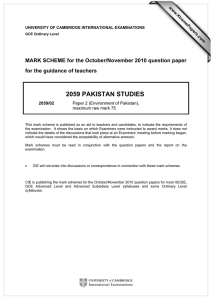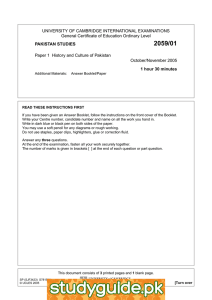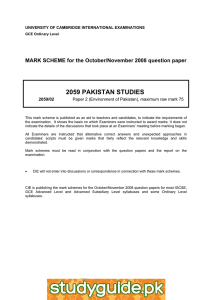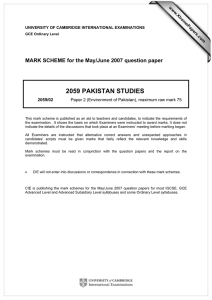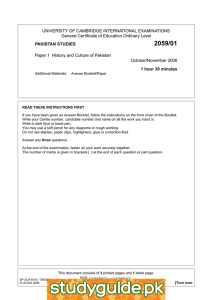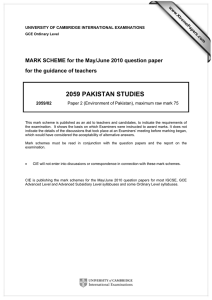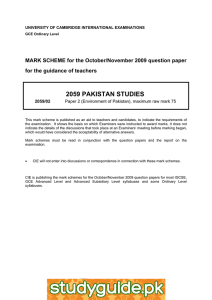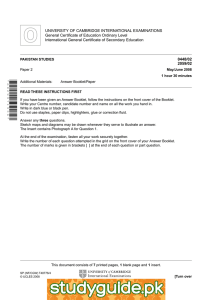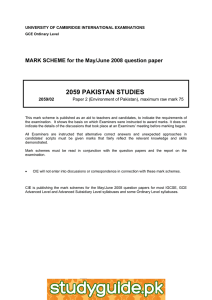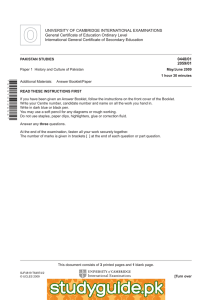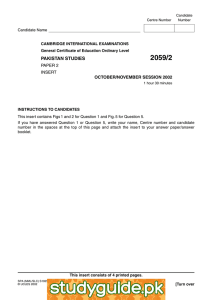2059 PAKISTAN STUDIES MARK SCHEME for the October/November 2010 question paper
advertisement
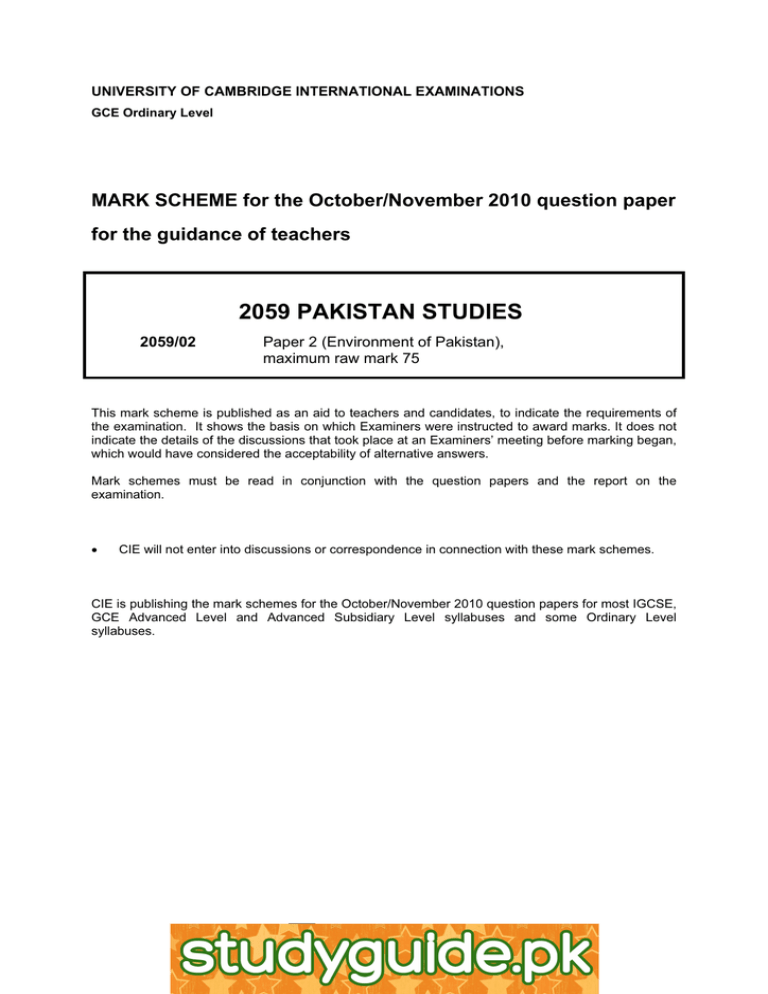
UNIVERSITY OF CAMBRIDGE INTERNATIONAL EXAMINATIONS GCE Ordinary Level MARK SCHEME for the October/November 2010 question paper for the guidance of teachers 2059 PAKISTAN STUDIES 2059/02 Paper 2 (Environment of Pakistan), maximum raw mark 75 This mark scheme is published as an aid to teachers and candidates, to indicate the requirements of the examination. It shows the basis on which Examiners were instructed to award marks. It does not indicate the details of the discussions that took place at an Examiners’ meeting before marking began, which would have considered the acceptability of alternative answers. Mark schemes must be read in conjunction with the question papers and the report on the examination. • CIE will not enter into discussions or correspondence in connection with these mark schemes. CIE is publishing the mark schemes for the October/November 2010 question papers for most IGCSE, GCE Advanced Level and Advanced Subsidiary Level syllabuses and some Ordinary Level syllabuses. www.XtremePapers.net Page 2 1 Mark Scheme: Teachers’ version GCE O LEVEL – October/November 2010 Syllabus 2059 (a) Study Fig. 1, which shows a map of Pakistan. Paper 02 [4] (i) Name the cities A, B and C, and the line of latitude D. A B C D Quetta Hyderabad Lahore 30°N (ii) With reference to Fig. 1, explain how the population density of the area north of the line D is related to relief (topography) and water supply. [5] Relief (res. 2) Higher density on (Indus) plain / flat land / low land Lower density in mountains / hills /sloping land Lower density in foothills of Hindu Kush / other named range Lower density in Sulaiman Hills / north Balochistan plateau NB. Candidate may refer to density in key or just ‘more’ or ‘less’ – allow. Water Supply (res. 2) Higher density where irrigated / rivers Higher density where more rain (in Northern Punjab) Lower density where less rainfall Lower density in deserts NB. Candidate may refer to density in key or just ‘more’ or ‘less’ – allow. (b) Study Fig. 2, which shows the weight of marine fish caught 1996–2006. The weight of fish caught in 2006 was less than in 1996. (i) Suggest two reasons for this decrease. [2] Over-fishing Water pollution / oil spills etc. Loss of breeding / shelter / feeding areas (i.e. mangroves) Fishing in closed season / when breeding Fishing by boats from other countries (ii) Describe how the weight of fish caught changed in the years between 1996 and 2006. [3] Increases and decreases / fluctuates Highest in 2002 Two peaks Lowest in 2006 No increase since 2003 / decline from 2004 Max and min. figures (only) © UCLES 2009 www.XtremePapers.net Page 3 Mark Scheme: Teachers’ version GCE O LEVEL – October/November 2010 Syllabus 2059 Paper 02 (c) Describe how marine fishing methods can be improved. [5] Boats with engines Can go further offshore Can stay at sea for several days Cold storage on boat Mechanised equipment / winches Nylon / bigger / stronger/ nets or ropes Weather forecasts Sonar to locate fish Satellite navigation Training / education (d) Study Fig.3. With reference to Fig. 3, explain the advantages and disadvantages of developing the fishing industry in Pakistan. [6] NB: This can include fish farming / freshwater fishing Advantages (res. 2) More food Healthier food / more protein etc. More employment / more income/ less unemployment Exports to – or of – (e.g. shrimps to Japan, dried fish to Middle East, to Sri Lanka) Better communications with – (e.g. better roads, telecommunications in Balochistan) More education by teaching skills More technology – introduction of engines, machines, radar, satellite navigation Growth of other industries e.g. Processing, boat building Sustainability as fish are ‘free’, should not ‘run out’ Disadvantages (res. 2) Education – lack of skilled labour Technology – costs money, imported Water pollution – kills, damages fish, Pakistan’s rivers are polluted, mangroves polluted Restrictions – marine fishing banned in June and July – controls on net size Quality – some products banned by western countries – can be poisonous / makes them unsuitable to eat Income – not large, delayed profit Sustainability – issues of over-fishing [Total: 25] © UCLES 2009 www.XtremePapers.net Page 4 2 Mark Scheme: Teachers’ version GCE O LEVEL – October/November 2010 Syllabus 2059 Paper 02 (a) Study Fig. 4 (Insert) which shows patterns of goat rearing in Pakistan. (i) Describe the distribution of goat rearing in Balochistan. [3] Widespread / low and moderate in most areas Main area in SE / E / Sindh border / Kalat / Khuzdar / Central Brahui Range / Kirthar Range / Indus Plain (allow up to 2 named areas) Main area in North / NW / NWFP border / Zhob Low in West / Western borders / Chagai Hills / Ras Koh / Kharan desert No information for coastal and some other areas (ii) Suggest why the government of Pakistan discourages the rearing of goats. [2] Overgrazing Loss of vegetation / deforestation Soil erosion / soil loose (iii) Why are there many nomadic farmers in Balochistan? [3] Shortage of / to search for grazing / food Shortage of / to search for water Agriculture / cultivation /crop growth difficult or impossible Low population (so plenty of land) (b) Explain why buffalo are not reared in Balochistan. [3] Lack of water to drink Lack of water to wash / lie in / bath in / keep cool Lack of water / buffalo need water (1) Lack of fodder crops / poor grazing Lack of demand / few urban areas (c) Study Photographs A and B (Insert) showing a buffalo farm in Lodhran district, Punjab. (i) How do the photographs show that these buffalo are being kept in good living conditions? [6] Photo A Covered shelters / shade / roof / shed etc. Brick / concrete / will not collapse Fodder / food Feeding trough Brick standing by troughs Clean conditions / dung cleared away Photo B Water for bathing / washing / cooling /drinking Concrete pool Clean water / water from well Organised storage of fodder / dung © UCLES 2009 www.XtremePapers.net Page 5 Mark Scheme: Teachers’ version GCE O LEVEL – October/November 2010 Syllabus 2059 (ii) Suggest why buffalo farms can often be found around urban areas. Paper 02 [2] Food (for urban population) / demand for milk or meat Must be fresh / deteriorates quickly Can make deliveries / supplied on a regular basis Products for processing, e.g. milk, ghee, butter (d) Meat provides a valuable source of protein in food, and there are many other useful products from animals. Explain the advantages and disadvantages of developing livestock farming in Pakistan. [6] Advantages (res. 2) More food / healthy food / great demand – with e.g. Other products – with example (hides, horn) Exports (with example) Employment / earnings Manure / dung / gobar / for burning Processing industries (with example) Sustainable e.g. animals reproduce, traditional skills Disadvantages (res. 2) Loss of land / water for food crops. Overgrazing problems. Less investment in other forms of farming. Low income / low profit. Disposal of waste / problems of cleanliness / pollution (with example) Cost of setting up / fodder / vets bills etc (max 2) Disease transfer to humans Some products not of export quality / banned by western countries Not sustainable e.g. (may refer to above) [Total: 25] © UCLES 2009 www.XtremePapers.net Page 6 3 Mark Scheme: Teachers’ version GCE O LEVEL – October/November 2010 Syllabus 2059 Paper 02 (a) Study Fig. 5, which shows the sectors of employment by percentage in Pakistan. (i) Which is the largest sector? [1] Paid employment (ii) Give an example of self-employment. [1] Farmer, shopkeeper, lorry driver etc. (iii) What is the percentage of ‘unpaid family workers’? [1] 25% (iv) State two jobs that may be done on a farm by unpaid family workers. [2] Sowing, harvesting, threshing, weeding, bird-scarer, feeding animals etc. (v) Suggest why many farms rely on unpaid family workers. [3] Poverty / cannot afford hired labour Subsistence / small farms Manual labour / not mechanised Large families / no other jobs available Inherited / learned skills (b) Explain the push factors, other than low pay that may cause rural-urban migration. [5] Lack of: – clean water / sanitation / poor health – health care facilities / hospitals / clinics – education / illiteracy – electricity / bright lights etc. – jobs / mechanisation – farmland / subdivision of land – entertainment – example – food / malnutrition Degradation of land / salinity/soil erosion Power of the landlords / Zamindari etc. Political problems / Taliban / Al Kaida etc. Natural disasters / drought etc. © UCLES 2009 www.XtremePapers.net Page 7 Mark Scheme: Teachers’ version GCE O LEVEL – October/November 2010 Syllabus 2059 Paper 02 (c) Study Photograph C (Insert), which shows a valley in Shangla district, NWFP. (i) With reference to the photograph, explain why agriculture is difficult in this area. [4] Difficulties (must be explained) Soil erosion Lack of flat land Other land uses in valley base Poor soils Lack of irrigation Lack of mechanisation (with reason) Cold temperatures / snow and ice Rabi crops cannot be grown Lack of water in winter Flooding in summer Problems of terraces (ii) Name two cottage industries that could be developed in this area. [2] Allow 1 general and 1 specific cottage industry Specific – carpet, knitting, weaving, wood carving, etc. (d) Choose two of the improvements shown below, and explain to what extent these two improvements could create more employment opportunities in mountain valleys. [6] ROAD BUILDING RELIABLE ELECTRICITY SUPPLY CLEAN WATER SUPPLY BETTER TELECOMMUNICATIONS Reserve 1 mark for one limitation / problem of one chosen improvement (i.e. ‘to what extent’) ROAD BUILDING Ideas such as: – Transport so more industries established – Cottage / small scale industries grow – Trade (with example) – Tourism (with example) – Settlement so more service industries – Road construction and supply work – Jobs – e.g. drivers, maintenance, roadside services etc. BUT – high maintenance environment / roads often need repair etc. RELIABLE ELECTRICITY SUPPLY Similar to above Ideas such as: – Can work day and night – Can use computers etc. – Opportunities for mechanisation of cottage industries /more light or heat – Construction of new HEP schemes – More tubewells for agriculture BUT – can supply be reliable? / problem of shortages etc. © UCLES 2009 www.XtremePapers.net Page 8 Mark Scheme: Teachers’ version GCE O LEVEL – October/November 2010 Syllabus 2059 Paper 02 BETTER TELECOMMUNICATIONS Similar to above Ideas such as – IT opportunities – More sales etc. – Construction of infrastructure BUT – cost of infrastructure, chance of damage etc. CLEAN WATER SUPPLY Similar to above Ideas such as – More food processing industries – Healthy so more working days BUT – shortage of water, winter freezing etc. Allow ‘attracts investment’ and ‘attracts industry’ only once unless well developed. Reserve 2 marks for each of 2 factors chosen. Reserve 1 mark for disadvantage / limitation to one factor The mark scheme for (d) is not exhaustive. Credit what comes that is relevant to employment opportunities. Credit can be give for negative answers e.g. ‘this is not possible’. [Total: 25] 4 (a) Study Fig. 6, which shows energy sources by percentage in Pakistan. (i) Name the two largest sources of energy. [2] Gas and oil (ii) Which source named on Fig. 6 is renewable? [1] HEP (iii) Suggest two sources of energy in the ‘others’ sector of Fig. 6. [2] 2 of coal, coke, solar, wind, nuclear, etc. (b) (i) Name an HEP (hydel) power station and state the name of the river on which it is built. [2] Tarbela on the River Indus Mangla on the River Jehlum Warsak on the River Kabul (see atlas or textbook for others) Credit correct dam for 1 mark even if not on correct river © UCLES 2009 www.XtremePapers.net Page 9 Mark Scheme: Teachers’ version GCE O LEVEL – October/November 2010 Syllabus 2059 Paper 02 (ii) Why is HEP (hydel) an important source of electricity in northern Pakistan ? [3] Cheap to generate Renewable Available / no fossil fuels / no thermal power stations Rivers / water from glaciers High rainfall Lack of evaporation / lower temperatures Deep / steep sided valleys for dams No air pollution / CO2 (iii) Why can the supply of power from these stations be unreliable? [3] Shortage / not enough for every user/ load shedding Silting in reservoir (reduces capacity) Silt in turbines (causes damage) Seasonal shortages e.g. winter / frozen / monsoon etc. Lack of rainfall / changing climate Theft Damage to power lines Old / worn machinery (c) Study Fig. 7, which shows the location of Faisalabad. State three factors shown on Fig. 7 which influence the cotton industry in Faisalabad. For each factor, explain its importance to the development of this industry. [6] (Reserve 3 marks for factors) Irrigated farmland Rivers/barrages Road/railway Dry port Thermal power Airport – for raw cotton e.g. Rechna Doab – supply water for washing cotton – for supply of goods, sales – for exports, transport to Karachi – for electricity supply for machines etc. – for businessmen (d) Study Fig. 8. In recent years there has been little growth in the cotton textile industry. With reference to Fig. 8, explain the advantages and disadvantages of increasing cotton textile production in Pakistan. [6] Candidates can choose as many factors as they like. Reserve 2 marks for advantages, and 2 marks for disadvantages / problems JOBS More available, can reduce unemployment, higher income, formal employment, move from primary to secondary BUT need for literacy and skills, may cause rural urban migration and its consequences SKILLS Beneficial to workforce, higher earnings, BUT shortage of training at the present time © UCLES 2009 www.XtremePapers.net Page 10 Mark Scheme: Teachers’ version GCE O LEVEL – October/November 2010 Syllabus 2059 Paper 02 COMPETITION Will improve standards BUT cannot compete, low quality of Pakistan products, synthetics may be cheaper TRADE Will stimulate / increase trade, earn foreign exchange, improve balance of payments, pay off debts BUT inadequate port facilities, poor roads / rail etc. TECHNOLOGY Good for development, can improve quality and / or quantity BUT high cost, lack of skilled workforce, unemployment, shortage of electricity, more imports INFRASTRUCTURE Stimulates construction of better roads, railways, power supply, water supply BUT higher costs, shortages at source, others may lose supply e.g. power, water GENERAL Increase GDP BUT – may cause less investment in other industries less land for food crops quality must be good leaf curl virus / other pests climatic limitations etc. [Total: 25] 5 (a) Study Fig. 9, which shows an advertisement for a big company. (i) State four ways of contacting this company. [2] 2 ways = 1 mark Telephone (number) Fax E-mail / web site / internet Letter / address Visit (ii) Which is the slowest way of contact? [1] This depends on the answer to (i). Order of speed: e-mail – fax - telephone – letter – visit (iii) Why does the company advertise many different ways of contacting it? Easy Choice Depends on distance To attract foreign interest Visit is more personal © UCLES 2009 www.XtremePapers.net [1] Page 11 Mark Scheme: Teachers’ version GCE O LEVEL – October/November 2010 Syllabus 2059 Paper 02 (b) (i) Explain two of the reasons given in the advertisement for using this tractor on a farm? [2] (1 mark for each line) Big and powerful Quick and efficient Many tasks Replaces several animals, reduces labour force, faster, larger farms Saves time, better cultivation Higher yield, better than manual labour Only one machine needed, can plough and harvest, reduces labour force (ii) Why are tractors not used by many small-scale farmers? [4] Too expensive to buy High cost of leasing / fuel / maintenance etc. Farmers are subsistence farmers Little profit / low yields Small fields / farms Lack training / skills / education Plenty of family / cheap labour / cause family unemployment Cannot take loans (iii) In what ways can the government help small-scale farmers to mechanise their farms? [4] Loans Leasing / hiring Subsidies / reduced costs / cheap / goods affordable (not ‘free’ or ‘give’) Training / education Advertising / leaflets / use of media Land reform / consolidation so that – Promote co-operatives (c) (i) From the list below state two imports and two exports. COTTON MACHINERY CRICKET BATS 2 correct imports = 1 mark Imports Exports WHEAT [2] IRON ORE SURGICAL EQUIPMENT LEATHER COMPUTERS 2 correct exports = 1 mark machinery, wheat, iron ore, computers cotton, leather, cricket bats, surgical equipment (ii) The European Union (EU) is a major trading partner of Pakistan. Name two countries in this trading community. [2] Any 2 EU countries (iii) Why it is important that Pakistan trades both imports and exports with the EU? [2] To improve / maintain the balance of payments To increase / maintain foreign currency To make good relations / trade agreement © UCLES 2009 www.XtremePapers.net Page 12 Mark Scheme: Teachers’ version GCE O LEVEL – October/November 2010 Syllabus 2059 Paper 02 (d) The development of wind power generators off the coast of Pakistan could reduce the country’s dependence on imported fuels. Explain the advantages and disadvantages of developing alternative power sources. [5] NB The introduction refers to wind, but the question is about any alternative power supply. Advantages (of any alternative power supply) (res. 2) Cheap power (after construction) Renewable / do not run out. Reduces CO2 emissions / air pollution / harmful gases Free resource / readily available E.g. sunny climate, coast, mountains for HEP Increases supply of electricity / less loadshedding / power cuts Can be used in remote areas / mountains / deserts / etc. Lower cost of oil / coal imports / improves balance of trade / can pay off debt Disadvantages (of any alternative power supply) (res. 2) Expensive to build / cost of import Expensive / foreign technology Unreliable (referring to weather etc.) Lack of skills / expertise Low output from generators May not be in areas where power is needed / much of country a long way from coast [Total: 25] © UCLES 2009 www.XtremePapers.net
